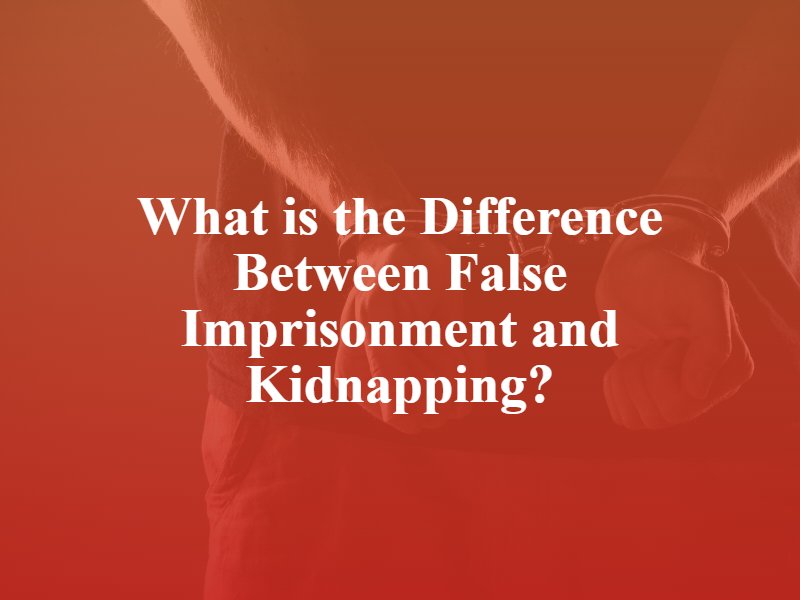
Imagine the horror of being unlawfully confined, restrained against your will, and denied the basic human right to move freely. This is the haunting reality that victims of false imprisonment face.
False imprisonment occurs when a person deliberately and unlawfully detains another person, leaving the victim traumatized and scarred long after his or her physical release. It inflicts deep emotional distress, instilling fear, anxiety, and a pervasive sense of powerlessness.
After this crime occurs, the state may file criminal charges against the perpetrator. Because false imprisonment can cause significant harm to a victim, false imprisonment can be both a crime and a tort, or a civil wrong that causes harm or injury. Because of this, victims have the right to pursue a civil claim for the harm that he or she experienced.
False Imprisonment Tort Defined
A person commits an act of false imprisonment when he or she restricts another person’s freedom of movement. It occurs against the victim’s will and without lawful justification. False imprisonment may involve confinement, restraint, or detention.
Examples of false imprisonment may include:
- A store security guard who detains a customer without reasonable suspicion of theft
- A healthcare professional who restrains a patient against his or her will and without medical necessity
- A police officer who unlawfully detains and arrests a person without probable cause
- A person who locks another person in a room without permission
- A nursing home staff member who medicates a patient without his or her consent while using physical or emotional threats
A tort is an act or failure to act that causes harm to another person and leaves the perpetrator open to liability. Any act of false imprisonment can lead to significant emotional, physical, and financial distress, and the victim has the right to hold the perpetrator accountable in civil court.
Criminal versus Civil Liability for False Imprisonment
False imprisonment can lead to both criminal and civil liability for the person responsible. In criminal cases, false imprisonment may result in charges filed by the state against the person responsible for the wrongful confinement. The penalties for criminal false imprisonment can include fines, probation, or even imprisonment, depending on the jurisdiction and severity of the offense.
In addition to criminal charges, the victim of false imprisonment can also pursue civil action against the person or entity responsible for the unlawful confinement. In a tort lawsuit, the victim seeks compensation for the harm he or she suffered as a result of the false imprisonment. This can include damages for emotional distress, loss of income, medical expenses, and other related losses.
There are several key differences between criminal charges and tort lawsuits involving false imprisonment:
- The victim, acting as the plaintiff, files a tort lawsuit against the perpetrator. In criminal cases, the state or county prosecutor files the charges.
- In a tort lawsuit, victims need to prove that the perpetrator is liable by the preponderance of the evidence, or that it is more likely than not that the false imprisonment occurred. In a criminal case, the prosecutor must prove that the crime occurred beyond a reasonable doubt.
- A perpetrator who is found liable for false imprisonment must pay damages to reimburse the victim for the harm and financial losses that he or she suffered. If a perpetrator is found guilty in a criminal case, he or she would face jail time, fines, and other penalties.
The Elements of a False Imprisonment Claim
By filing a tort lawsuit against the person who unlawfully detained you, you can recover compensation to help pay for medical care, lost wages, pain and suffering, and many other expenses.
To file a successful false imprisonment claim, however, you will need to provide sufficient evidence that proves four key elements:
- The perpetrator intentionally restrained you in a confined area.
- You did not consent to the restraint.
- You are aware of the restraint.
- The restraint occurred without legal justification.
For example, say that you are inside a corner store when a robber enters the premises. He displays a gun, orders everyone to lie on the floor, and threatens to shoot anyone who tries to leave.
In this situation, the robber did intentionally confine you to the area and you were aware that you were being restrained. The robber was committing a crime, so the restraint occurred without legal justification. Although you may have agreed with the robber’s request to lie on the floor and stay on the ground, you did not consent to it freely. Therefore, you could hold the robber liable for false imprisonment.

What Is the Difference Between False Imprisonment and Kidnapping?
False imprisonment and kidnapping are two distinct yet closely related terms. While they both involve the deprivation of liberty, there are key differences that set them apart.
Kidnapping occurs when one person abducts another and transports them to a new location against their will. This act of abduction is typically followed by the victim being held against their will. Kidnapping often involves the use of force, unlawful restraint, bodily injury, or the crossing of state borders or substantial distances.
Unlike kidnapping, false imprisonment does not involve the removal of the victim to a different location. Instead, it revolves around the act of confining or restraining someone against their will within their current surroundings.
Why You Need an Attorney for a False Imprisonment Claim
Navigating a false imprisonment claim can be an overwhelming and complex journey. Between the legal intricacies and the emotional trauma that you are facing, having the expertise and guidance of an attorney is essential.
A lawyer with experience in false imprisonment cases understands the intricacies of the law and can navigate the legal system on your behalf. He or she will analyze the specific details of your case, gather evidence, and build a strong legal strategy tailored to your situation. With his or her knowledge and expertise, your attorney can effectively advocate for your rights and seek the compensation you deserve.
Additionally, an attorney acts as your advocate, offering support and guidance throughout the entire process. Your lawyer will handle all communication with opposing parties, negotiate settlements, and, if necessary, represent you in court.
If you are the victim of false imprisonment, don’t navigate the complex legal system alone. Schedule a free consultation with a false imprisonment and mass tort attorney to discuss your case and explore your legal options.
